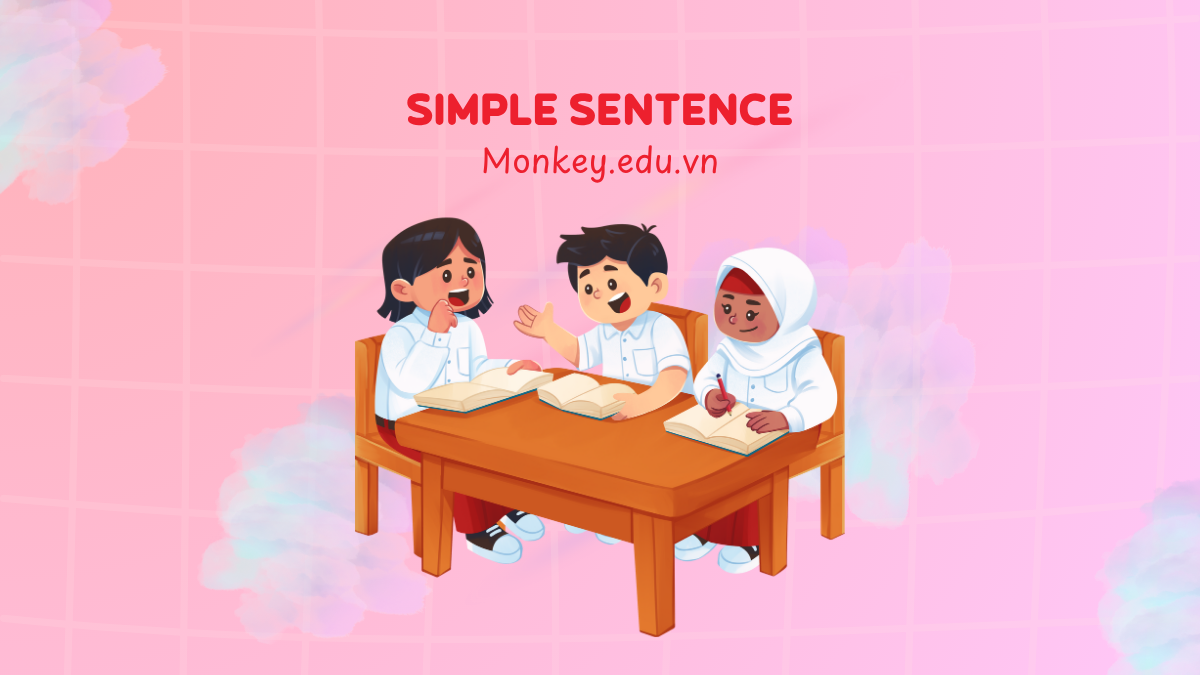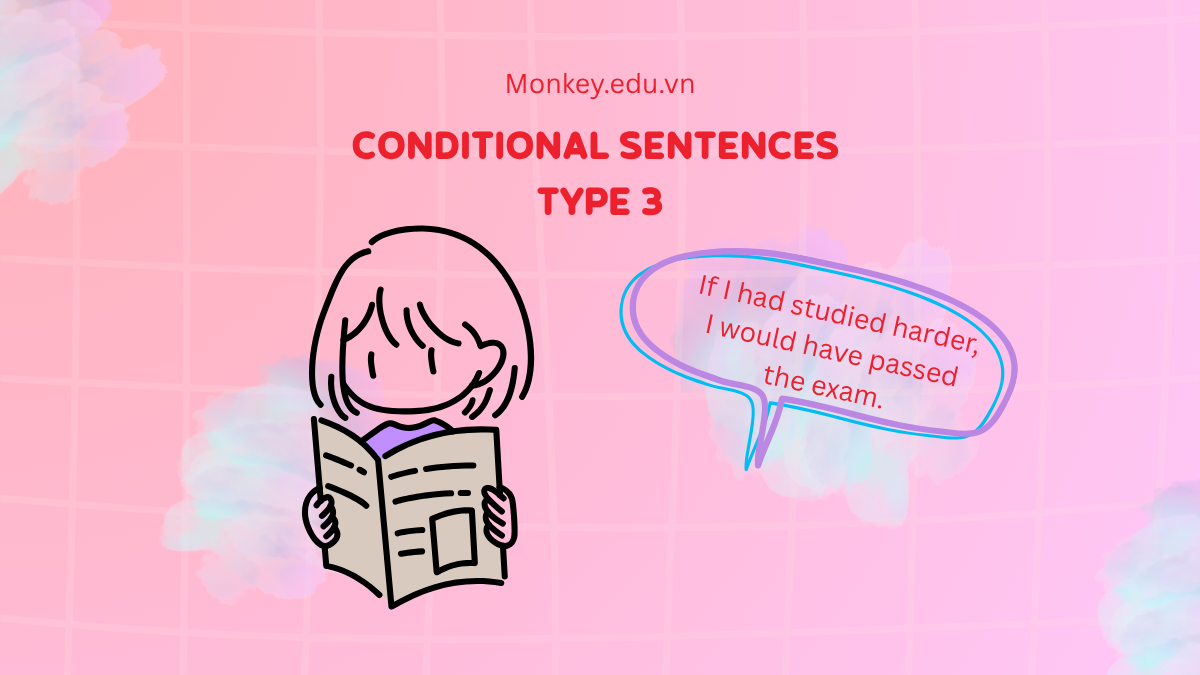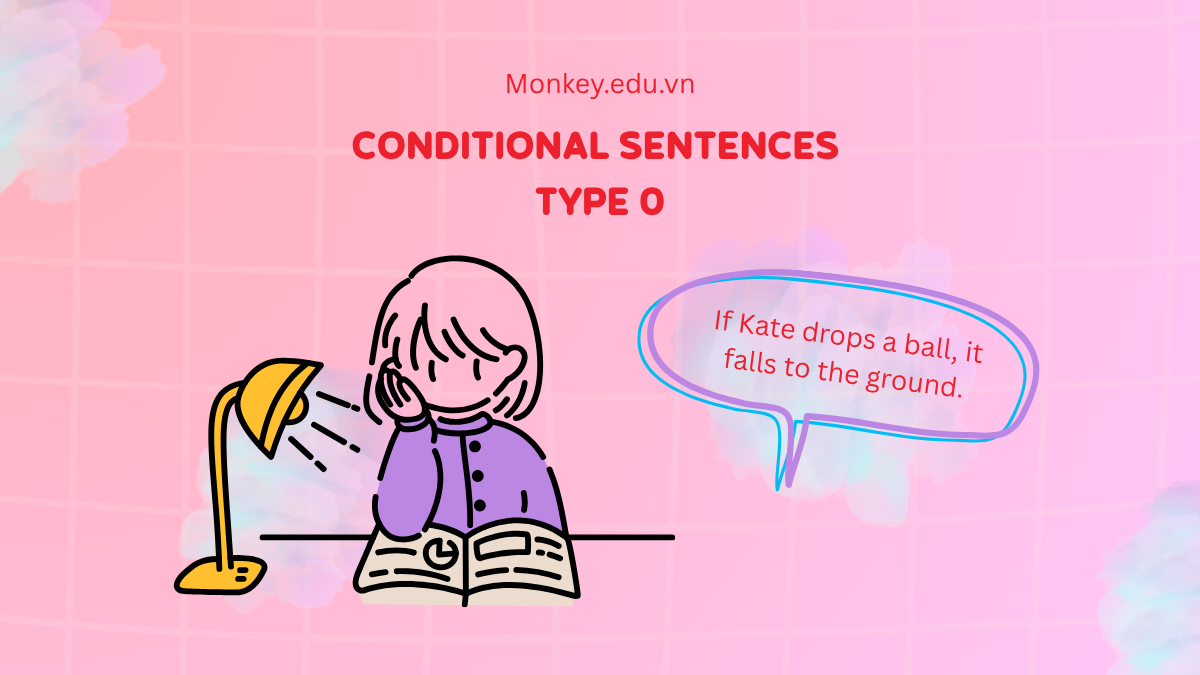Understanding your IELTS score is crucial for anyone aiming to study, work, or migrate abroad. This guide breaks down everything you need to know about your overall IELTS score and the individual scores for each section: Listening, Reading, Writing, and Speaking. Monkey'll explain how these scores are calculated and what they mean for your academic and professional future.
IELTS test format
The IELTS (International English Language Testing System) test assesses your English language proficiency across four key skills: Listening, Reading, Writing, and Speaking. There are two versions of the test:
-
IELTS Academic: For those applying for higher education or professional registration in an English-speaking country. The Reading and Writing sections are specifically designed to assess academic English skills.
-
IELTS General Training: For those migrating to an English-speaking country, or for training and secondary education. The Reading and Writing sections focus on everyday English in social and workplace contexts.
All test takers, regardless of whether they choose Academic or General Training, take the same Listening and Speaking tests. The Reading and Writing tests differ.
Listening (Approx. 30 minutes + 10 minutes transfer time)
Format: Four recorded monologues and conversations by native English speakers. You hear each recording only once.
Content:
-
Part 1: A conversation between two people in an everyday social context (e.g., booking a room).
-
Part 2: A monologue in an everyday social context (e.g., a speech about local facilities).
-
Part 3: A conversation between up to four people in an academic or training context (e.g., a group of students discussing a project with a tutor).
-
Part 4: A monologue on an academic subject (e.g., a university lecture).
Questions: 40 questions in total, covering various types like multiple choice, matching, form completion, note completion, summary completion, sentence completion, diagram labelling, and short-answer questions.
Marking: Each correct answer gets one mark. Scores are converted to the 9-band scale.
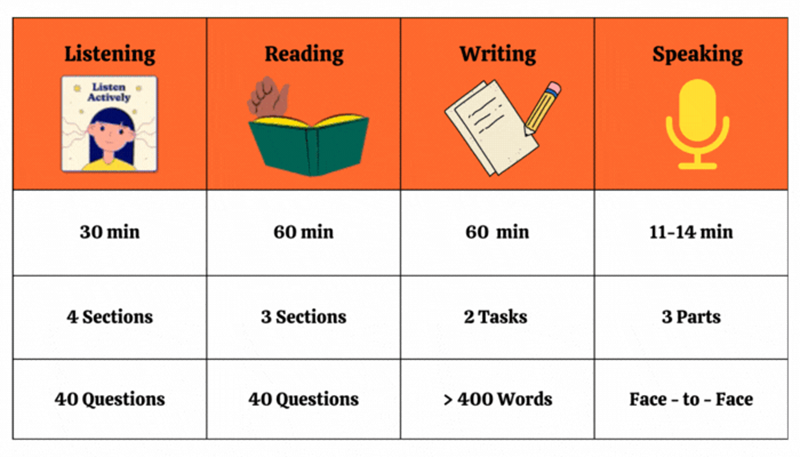
Reading (60 minutes)
Format: 40 questions based on three long texts. No extra time for transferring answers for computer-delivered tests; for paper-based, you write directly on the answer sheet.
Content:
-
Content (Academic): Texts are authentic and taken from books, journals, magazines, and newspapers. They are usually descriptive, factual, discursive, or analytical, suitable for university students.
-
Content (General Training): Texts are also authentic but are typically shorter excerpts from books, magazines, newspapers, notices, advertisements, company handbooks, and guidelines. They focus on topics relevant to everyday life and work.
Questions: A variety of question types, including multiple choice, identifying information (True/False/Not Given), identifying writer's views/claims, matching information, matching headings, matching features, matching sentence endings, sentence completion, summary/note/table/flow-chart completion, diagram label completion, and short-answer questions.
Marking: Each correct answer receives one mark. Scores are converted to the 9-band scale.
Writing (60 minutes)
Format: Two tasks.
Content:
-
Task 1 (20 minutes, min 150 words):
-
Academic: You are presented with a graph, table, chart, or diagram and asked to describe, summarize, or explain the information in your own words.
-
General Training: You are presented with a situation and asked to write a letter requesting information or explaining the situation. The letter can be formal, semi-formal, or informal.
-
Task 2 (Academic & General Training - 40 minutes, min 250 words): You are asked to write an essay in response to a point of view, argument, or problem. This task contributes twice as much to the Writing score as Task 1.
Marking: Assessed on Task Achievement/Response, Coherence and Cohesion, Lexical Resource, and Grammatical Range and Accuracy.
Speaking (11-14 minutes)
Format: A face-to-face interview with a certified examiner, recorded. It has three parts.
Content:
-
Part 1 (4-5 minutes): Introduction and general questions about familiar topics (e.g., home, family, work, studies, interests, hobbies).
-
Part 2 (3-4 minutes, including 1 minute preparation): You are given a topic on a “cue card” and have one minute to prepare before speaking for one to two minutes. The examiner will then ask one or two follow-up questions.
-
Part 3 (4-5 minutes): A two-way discussion with the examiner about more abstract issues related to the topic from Part 2. This part allows for deeper exploration of ideas and opinions.
Marking: Assessed on Fluency and Coherence, Lexical Resource, Grammatical Range and Accuracy, and Pronunciation.
Overall test duration
The Listening, Reading, and Writing sections are typically completed on the same day, one after another, with no breaks, lasting approximately 2 hours and 45 minutes. The Speaking test may be held on the same day or up to seven days before or after the other sections, depending on local arrangements at the test center.
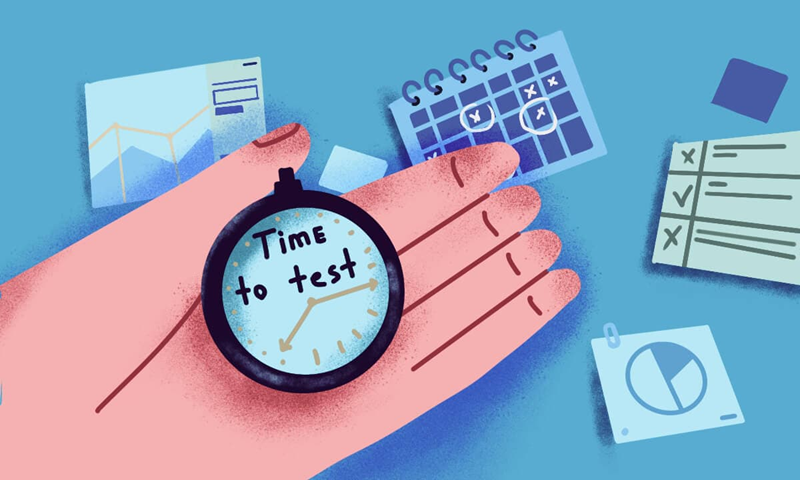
How to calculate IELTS scores for each section
The IELTS scoring system uses a 9-band scale, ranging from 1 (Non-user) to 9 (Expert User), for each of the four sections: Listening, Reading, Writing, and Speaking. You receive a band score for each section, and then an overall band score is calculated.
-
Listening: The IELTS Listening test includes 40 questions, with each correct answer earning 1 mark. Your raw score out of 40 is then converted into a band score (1-9) based on a conversion table that may vary slightly by test version. For example, a raw score of 39-40 typically equates to Band 9, while 30-31 corresponds to Band 7.
-
Reading: The IELTS Reading test also consists of 40 questions, with each correct answer earning 1 mark. Your raw score is then converted into a band score from 1 to 9, but the required score may differ slightly between Academic and General Training versions due to varying text difficulty. For instance, in Academic Reading, a score of 39-40 usually equals Band 9, while 30-32 may result in Band 7.
-
Writing: The IELTS Writing section is scored by certified examiners based on four criteria: Task Achievement/Response, Coherence and Cohesion, Lexical Resource, and Grammatical Range and Accuracy. Task 2 is weighted twice as much as Task 1, and each criterion is equally weighted within each task. The final Writing band score is the average of all scores given across both tasks.
-
Speaking: The IELTS Speaking test is a face-to-face interview assessed by a certified examiner based on four equally weighted criteria: Fluency and Coherence, Lexical Resource, Grammatical Range and Accuracy, and Pronunciation. Each criterion is scored from 0 to 9, and the final Speaking band score is the average of these four scores. This ensures a balanced evaluation of both language accuracy and communication skills.

Overall IELTS score and the meaning of each band level
The overall IELTS band score is a reflection of your average English language proficiency across all four skills: Listening, Reading, Writing, and Speaking. This score is rounded to the nearest whole or half band.
Here's a breakdown of what each IELTS band score means:
-
Band 9 (Expert User): You have a complete command of the language. Your use of English is appropriate, accurate, and fluent, with complete understanding. You grasp the cultural nuances of the language.
-
Band 8 (Very Good User): You have a fully operational command of the language with only occasional unsystematic inaccuracies and inappropriacies. You handle complex detailed argumentation well.
-
Band 7 (Good User): You have an operational command of the language, though with occasional inaccuracies, inappropriacies, and misunderstandings in some situations. You generally handle complex language well and understand detailed reasoning.
-
Band 6 (Competent User): You generally have an effective command of the language despite some inaccuracies, inappropriacies, and misunderstandings. You can use and understand fairly complex language, particularly in familiar situations.
-
Band 5 (Modest User): You have a partial command of the language, coping with overall meaning in most situations, though you are likely to make many mistakes. You should be able to handle basic communication in your own field.
-
Band 4 (Limited User): Your basic competence is limited to familiar situations. You have frequent problems in understanding and expression. You are not able to use complex language.
-
Band 3 (Extremely Limited User): You convey and understand only general meaning in very familiar situations. There are frequent breakdowns in communication.
-
Band 2 (Intermittent User): You have great difficulty understanding spoken and written English. You cannot communicate effectively.
-
Band 1 (Non-User): You have no ability to use the language except for possibly a few isolated words. This may also be given if you did not attempt the test.
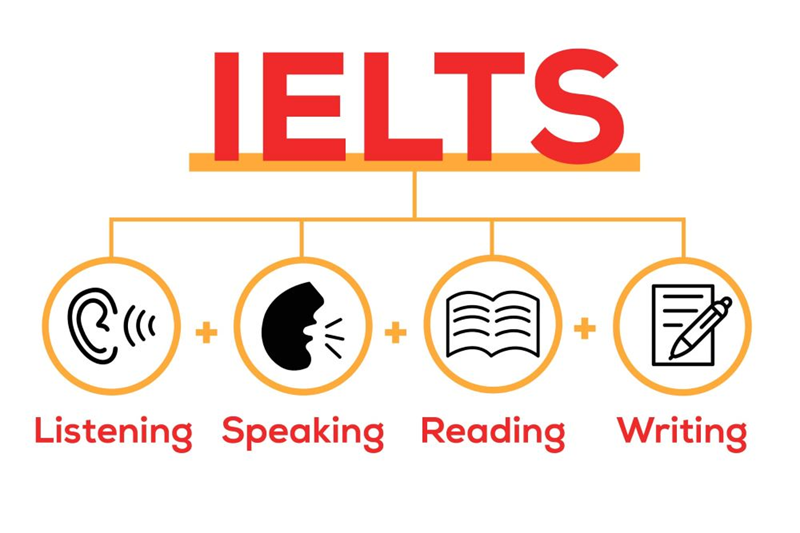
What is an IELTS certificate used for?
An IELTS certificate is used to demonstrate your English language proficiency for a variety of purposes. Common uses include:
-
University admission: Many universities and colleges in English-speaking countries require IELTS scores as part of their application process, especially for international students.
-
Immigration: Governments in countries like Canada, Australia, New Zealand, and the UK often require IELTS for visa and permanent residency applications.
-
Employment: Employers, especially multinational companies or those based in English-speaking countries, may request IELTS scores to assess a candidate's language skills.
-
Professional registration: Certain professional bodies (e.g., in healthcare, law, or engineering) require IELTS for licensing or certification.
Frequently asked questions about IELTS scores
1. What is a good IELTS score?
A good IELTS score is subjective and depends on your purpose. Universities often require scores between 6.0 and 7.5 for undergraduate and postgraduate programs. Immigration purposes may require specific minimum scores for each section, typically around 6.0 or higher. Always check the specific requirements of the institution or immigration authority you are applying to.
2. How long is an IELTS score valid?
IELTS scores are generally valid for two years from the test date. This is because language proficiency can change over time. Some organizations may accept scores older than two years if you can provide evidence that you have maintained or improved your English language proficiency since the test date.
3. Can I retake the IELTS test if I'm not happy with my score?
Yes, there are no restrictions on how many times you can retake the IELTS test. You can re-sit the test as many times as you like until you achieve your desired IELTS score. It's often recommended to prepare thoroughly before re-taking to ensure an improved result.
4. How do I receive my IELTS score report?
Your Test Report Form (TRF) will typically be available 13 days after your paper-based test or 3-5 days after your computer-delivered test. You can usually view your results online first, and then a physical copy of the TRF will be mailed to you or can be collected from the test center.

Navigating the intricacies of your IELTS score, both overall and for each specific section, is key to leveraging your results effectively. Monkey hope this comprehensive overview has clarified how your IELTS score is determined and what each band signifies. Use this knowledge to confidently pursue your global aspirations!




.png)


